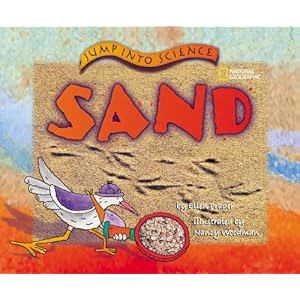What is sand? Where does it come from? Do people buy it from Lowe’s and spread it on the ground to make beaches?
To figure out what sand is, the kids grabbed some magnify glasses and took a closer look. They found small pieces of rock and shell. The conclusion: Sand is made from small pieces of rock and shells.

Next we built a “beach” to show how waves move rocks and shells. We added equal amounts of sand, aquarium gravel, and water (tinted with blue food coloring ~ just to make it pretty.) to a plastic container. 
We took turns rocking the container back and forth to show how waves form and wash through the rocks, distributing the sand and rocks over the entire container. 
The conclusion: Waves move the sand and rocks. I explained that water bangs the rocks together, wears the rocks down (erosion), and helps form sand. Water and wind carries the sand to form beaches and dunes.
Next came the fun part of the experiment ~ we made sand. To do this the kids added some small rocks, which I washed really well to remove any dirt, and water to a plastic container. Emily shook the container, shook it some more,
and shook it some more.
After about 3 minutes we opened the container to see what was happening to the rocks. We discovered brown water. I poured some of the water into a clear container so they could see what was floating in the water. The girls conclusion: I didn’t wash all the dirt off the rocks.
I assured them that I did wash the rocks and had them look in the bottom of the container we used to shake the rocks. They discovered small pieces on the bottom ~ sand!
The Final Conclusion: I did wash the rocks! The brown water was caused from tiny rock particles floating in the water. The girls agreed that the water bounced the rocks together, forming sand.
We ended our experiment by reading Jump into Science Sand.
Wonder where Aiden was during all of this? I really thought he would enjoy this experiment. It included jumping around and water, two of his favorite things! Not this time ~ he worked on his tractor most of the time.
He did find a dead caterpillar.
I’ll just consider that his contribution to our science lesson!
~Cindy











13 comments:
I love this experiment for explaining where Sand comes from!
I love this post! It is a very neat experiment and I loved that you included what your smallest one was doing meanwhile! I have some sand/beach experiments that we have done as well. Here is the link to one of them:
http://homeschooljournal-bergblog.blogspot.com/2008/08/beach-bucket-sorting.html
-Phyllis
Excellent exploration of sand - I love that you made your own - very cool!
I just found your blog via Preschool Corner, and love it (and became a follower)! This experiment is great, I love the way you put it together!
I love this experiment!
My kids would love it!
This is a great experiment. :)
All this fun without getting any sand in your swimming suit...AWESOME!
How cool! I went to a class one time where the teacher told us she collected sand from every beach she went to for comparisons, and I always thought that was a cool idea, but did I ever follow up on it, no........
I'm so remembering this when we get to geology, or when my kids ask about sand.
oo what a cool experiment! Your kiddos are getting all ready to take on the beach!
We did a similar activity when we did our beach/ocean unit at the beginning of last year. But no dead caterpillars, too bad, Caleb would have liked that.
Great ideas for sand experiment. I have to remember them when we get to our "beach" theme. I think not every rock would produce sand just by shaking - only very soft ones, but I am glad that it worked so well for you. I did love the first conclusion the girls drew :)
Ran across your post by accident. Was glad I did. That was a great experiment for the children, and fun too. :)
Love this! Best, Catherine www.frenchtoastandwine.com
Post a Comment